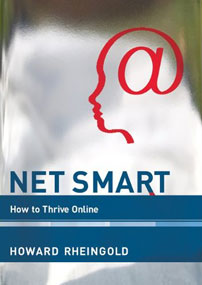The Circulating Ideas podcast recently featured a fascinating discussion with author and digital literacy expert Howard Rheingold. Rheingold’s book Net Smart explores literacy in a digital age and touches on some of the skills that are critical for learning, particularly in regards to online information access.
You can download Steve Thomas’ interview with Howard Rheingold from the Circulating Ideas podcast stream (Itunes). In the interview Rheingold speaks about the role of Wikipedia in research, Facebook’s threat to an open web culture and some of the skills that all learners need to find reliable and authoritive information online. Rheingold also advocates for the importance of librarians in teaching critical literacy skills and modelling effective research techniques.
For more of Howard Rheingold’s thoughts about the topic you might also read an interview with him by Henry Jenkins entitled How did Howard Rheingold get so Net Smart? You can find links to the three part interview below and keep up to date with Howard’s work through his website and on Twitter.
How did Howard Rheingold get so Net Smart? Interview: Part 1, Part 2, Part 3

